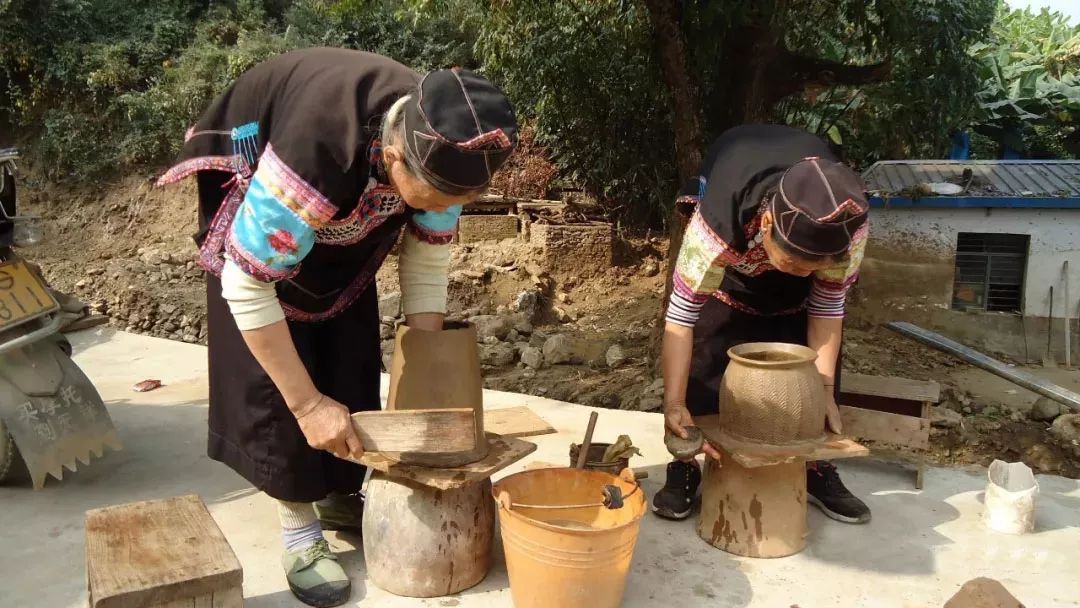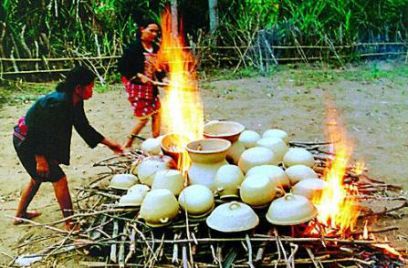
Nali Village and Pottery Making in Yuanyang County, Honghe
Overview of Nali Village
Nali Village (那里村), located near the Yaduo River in Yuanyang County (元阳县), Honghe Prefecture (红河州), is steeped in the unique ethnic characteristics of the Dai people (傣族). With a population of 206 residents, all belonging to the Dai ethnic group, this picturesque village is characterized by its lush greenery and scenic beauty. The village, perched at an elevation of 250 meters, is developed with modern amenities such as concrete roads, basketball courts, and activity rooms, giving it a relatively affluent suburban appearance.
Pottery Tradition
The residents of Nali Village, like many other Dai people, have a long-standing affinity for pottery. Their history of pottery-making dates back thousands of years to the Neolithic period, and it includes a variety of traditional earthenware items. Villager Bai Yonglu (白永禄) explains that due to economic hardship in ancient times, families often resorted to making their own pottery items, including pots for cooking, jars for storage, and bowls for eating. Even today, this tradition persists, with a few families still crafting pottery that reflects their rich cultural heritage.
Craftsmanship and Community
The unique relationship between the people and their environment allows them to continuously create marvels in pottery-making. Currently, there are about seven to eight families still producing traditional earthenware items, particularly clay pots that serve practical purposes for cooking. These pots come in various shapes and sizes and are beloved for their rustic beauty and ability to retain heat, making food cooked in them flavorful and tender.
The Story of the “Magic Pot”
Bai Yonglu recounts an entertaining story about a farmer who once lived in the mountains and used a special clay pot for cooking. One day, while cooling his food outside, a passing muleteer noticed the pot was boiling without fire, leading to a humorous exchange where the farmer traded the pot for a mule. This story illustrates the local appreciation for their pottery.
Women’s Role in Pottery Making
Pottery in Nali Village is predominantly crafted by women, adhering to a long-standing tradition. The entire pottery-making process—from soil collection and preparation to molding and firing—is exclusively performed by women. Li Xiaomei (李小妹), a renowned potter born in 1929, has passed down her skills to her daughter-in-law, Li Xiufen (李秀芬), and her granddaughters. Li Xiufen continues to create and sell pottery, ensuring the tradition endures.
The Cultural Significance
The pottery-making process in Nali Village embodies the principles of patience and precision, reflecting the unique characteristics of Dai culture. On December 12, the village celebrates the “Clay Pot Festival,” attracting visitors and showcasing their rich traditions.
Economic and Cultural Development
With the successful UNESCO World Heritage application of the Yuanyang Hani Terraces, local tourism has flourished. Nali Village is actively promoting its pottery-making heritage and cultural tourism, holding annual festivals to display their traditional crafts. Bai Yonglu has even transformed an old house into a museum, featuring pottery exhibits for tourists.
Getting There
Nali Village is accessible via the secondary highway along the Yaduo River. Visitors can take public transport or drive from major cities in the region, such as Kunming (昆明) or Jianshui (建水). It’s advisable to check local transport schedules for the most convenient options.
Travel Tips
- Best Time to Visit: The dry season from October to April is ideal for visiting Nali Village, as the weather is pleasant.
- Cultural Respect: Engage respectfully with the local community and their traditions. Participate in pottery workshops if available.
- Photography: Seek permission before photographing locals, especially during traditional ceremonies.
- Local Cuisine: Don’t miss out on trying local dishes served in traditional clay pots for an authentic experience.


 7 Days GolfingTour
7 Days GolfingTour
 8 Days Group Tour
8 Days Group Tour
 8 Days Yunnan Tour
8 Days Yunnan Tour
 7 Days Shangri La Hiking
7 Days Shangri La Hiking
 11 Days Yunnan Tour
11 Days Yunnan Tour
 6 Days Yuanyang Terraces
6 Days Yuanyang Terraces
 11 Days Yunnan Tour
11 Days Yunnan Tour
 8 Days South Yunnan
8 Days South Yunnan
 7 Days Tea Tour
7 Days Tea Tour
 8 Days Muslim Tour
8 Days Muslim Tour
 12 Days Self-Driving
12 Days Self-Driving
 4 Days Haba Climbing
4 Days Haba Climbing
 Tiger Leaping Gorge
Tiger Leaping Gorge
 Stone Forest
Stone Forest
 Yunnan-Tibet
Yunnan-Tibet
 Hani Rice Terraces
Hani Rice Terraces
 Kunming
Kunming
 Lijiang
Lijiang
 Shangri-la
Shangri-la
 Dali
Dali
 XishuangBanna
XishuangBanna
 Honghe
Honghe
 Kunming
Kunming
 Lijiang
Lijiang
 Shangri-la
Shangri-la
 Yuanyang Rice Terraces
Yuanyang Rice Terraces
 Nujiang
Nujiang
 XishuangBanna
XishuangBanna
 Spring City Golf
Spring City Golf
 Snow Mountain Golf
Snow Mountain Golf
 Stone Mountain Golf
Stone Mountain Golf


















